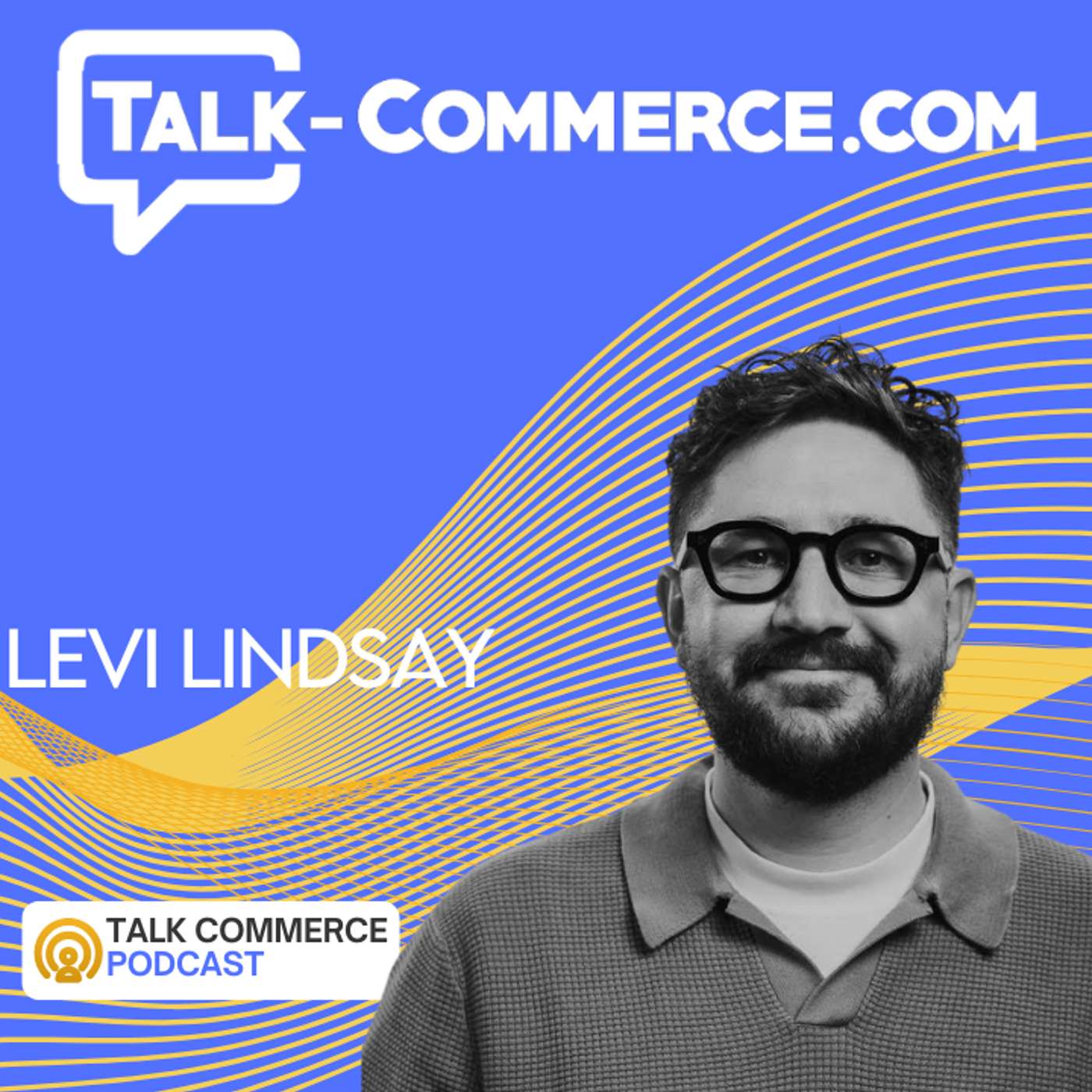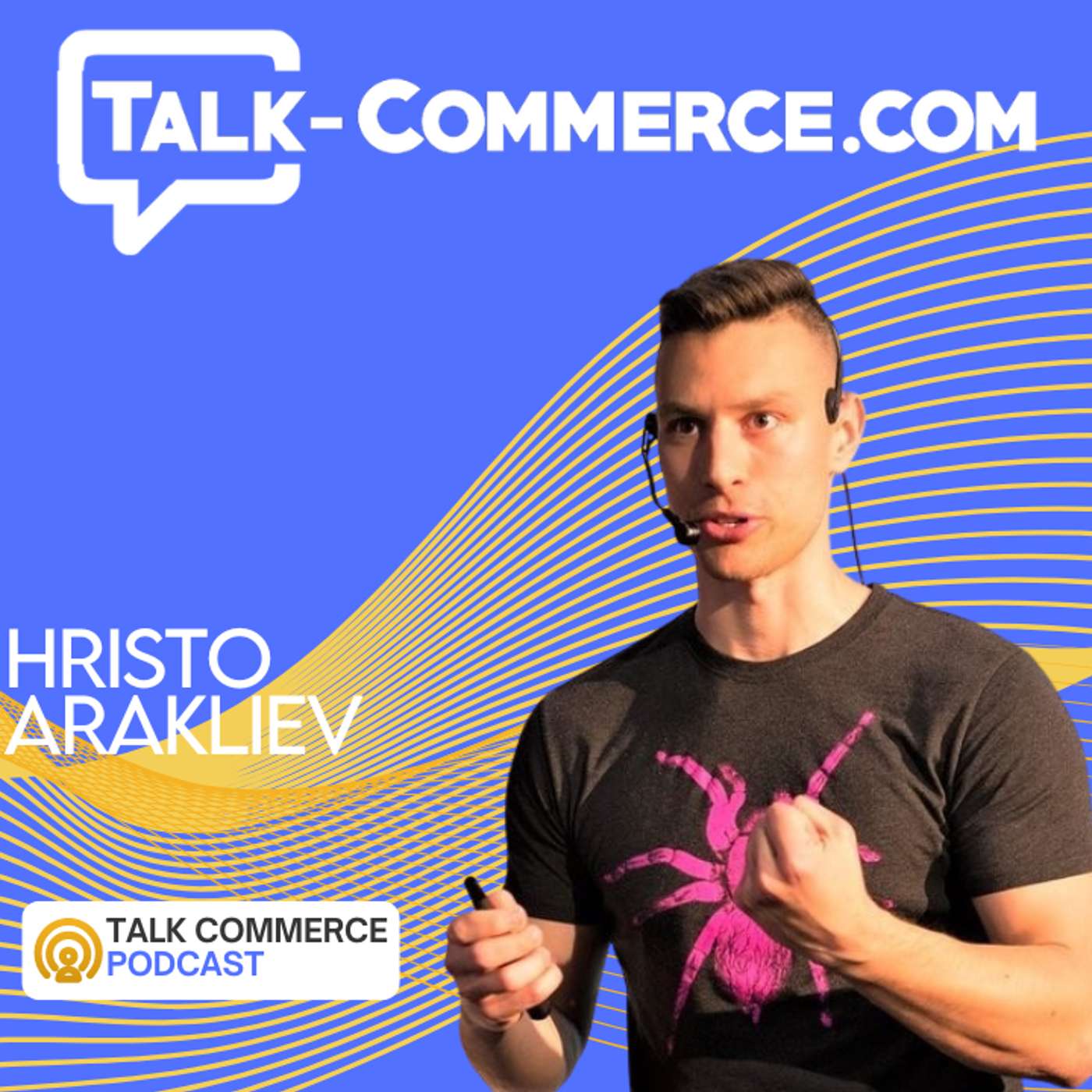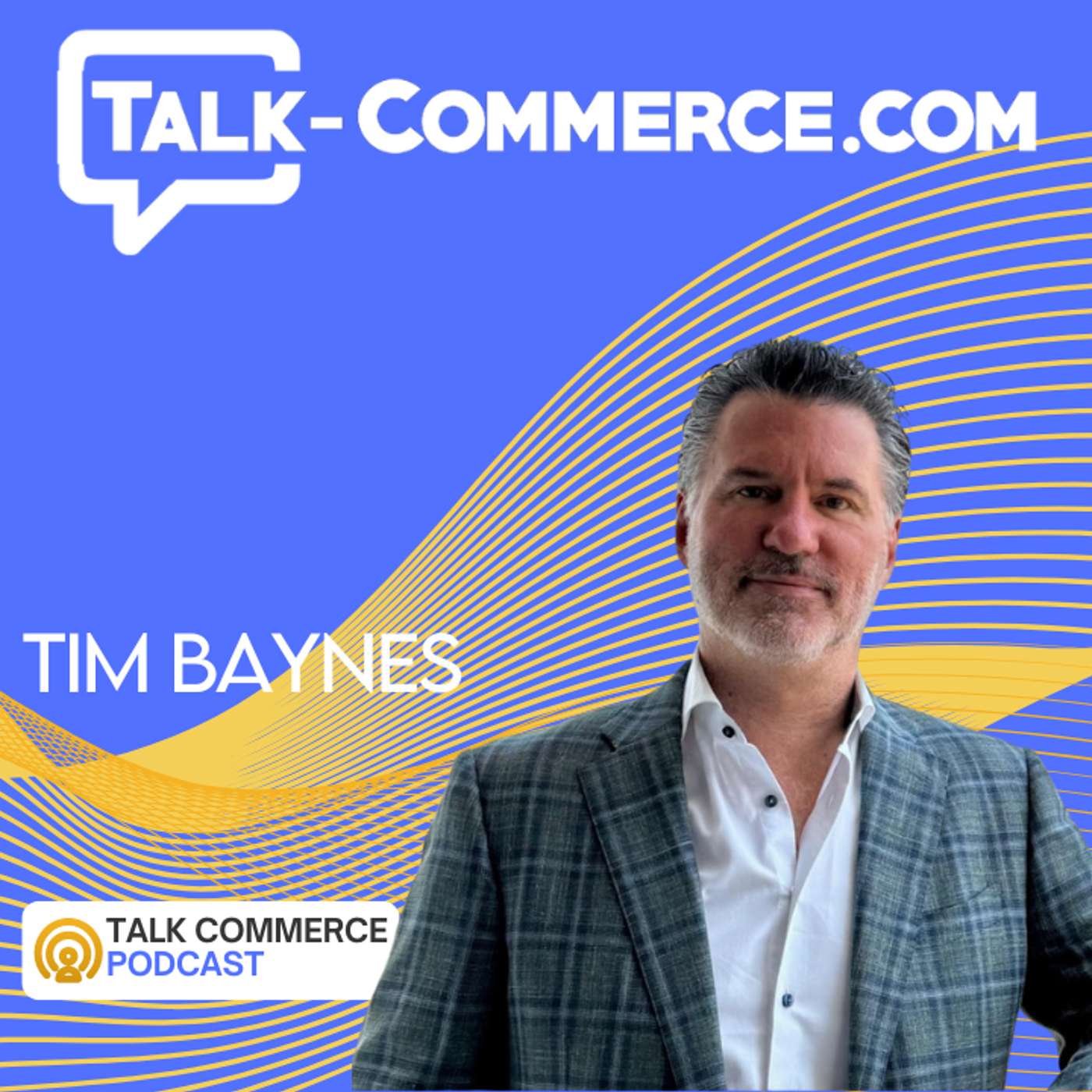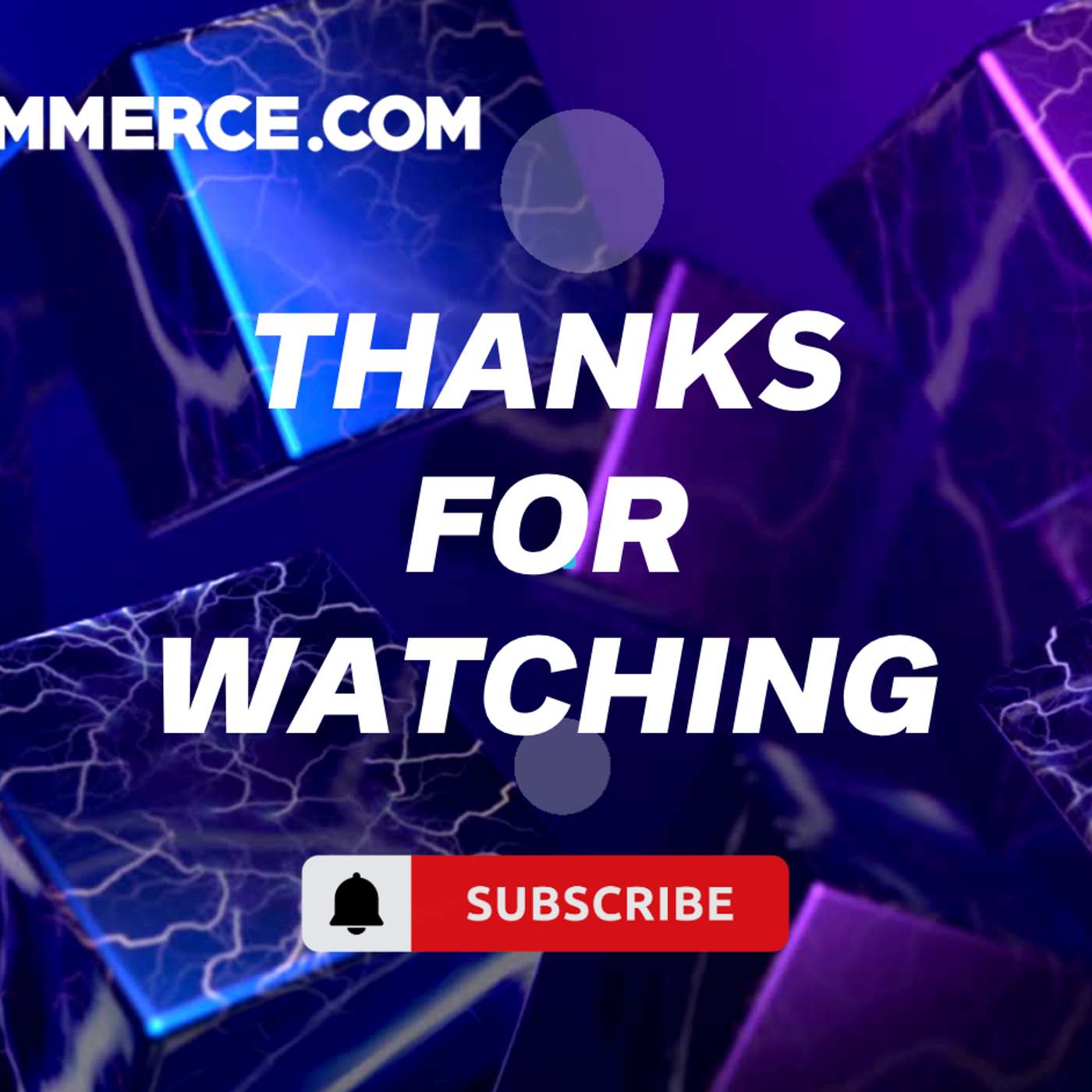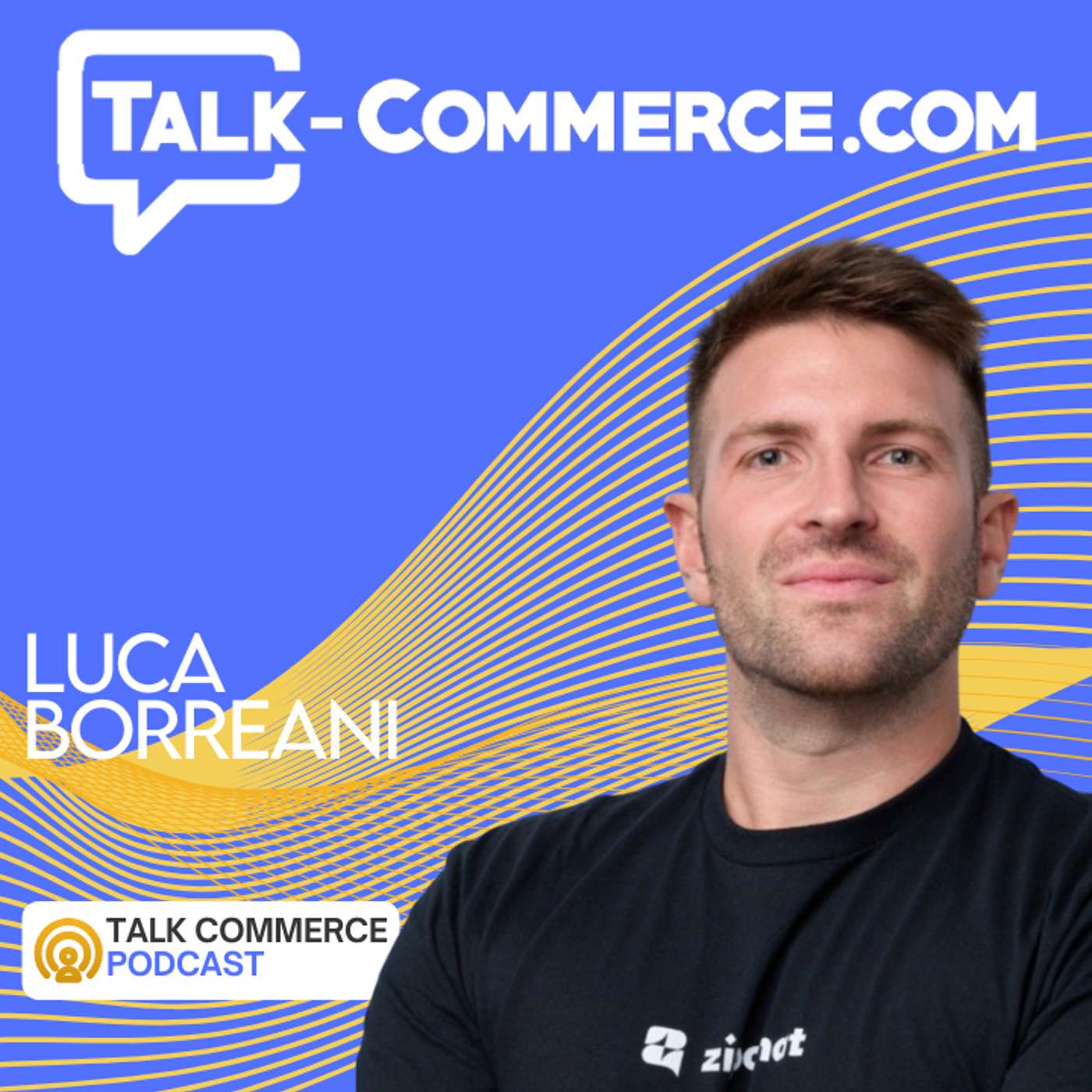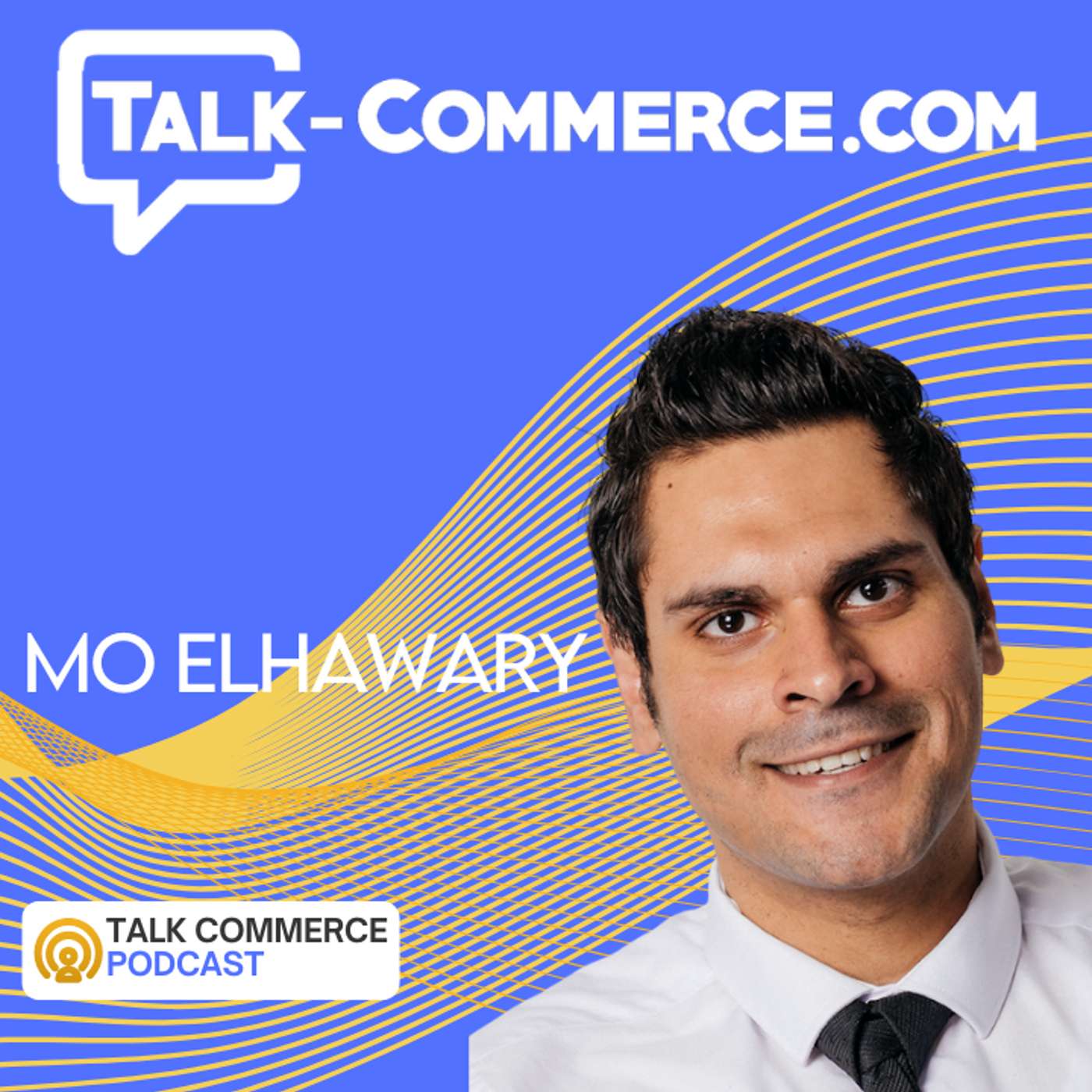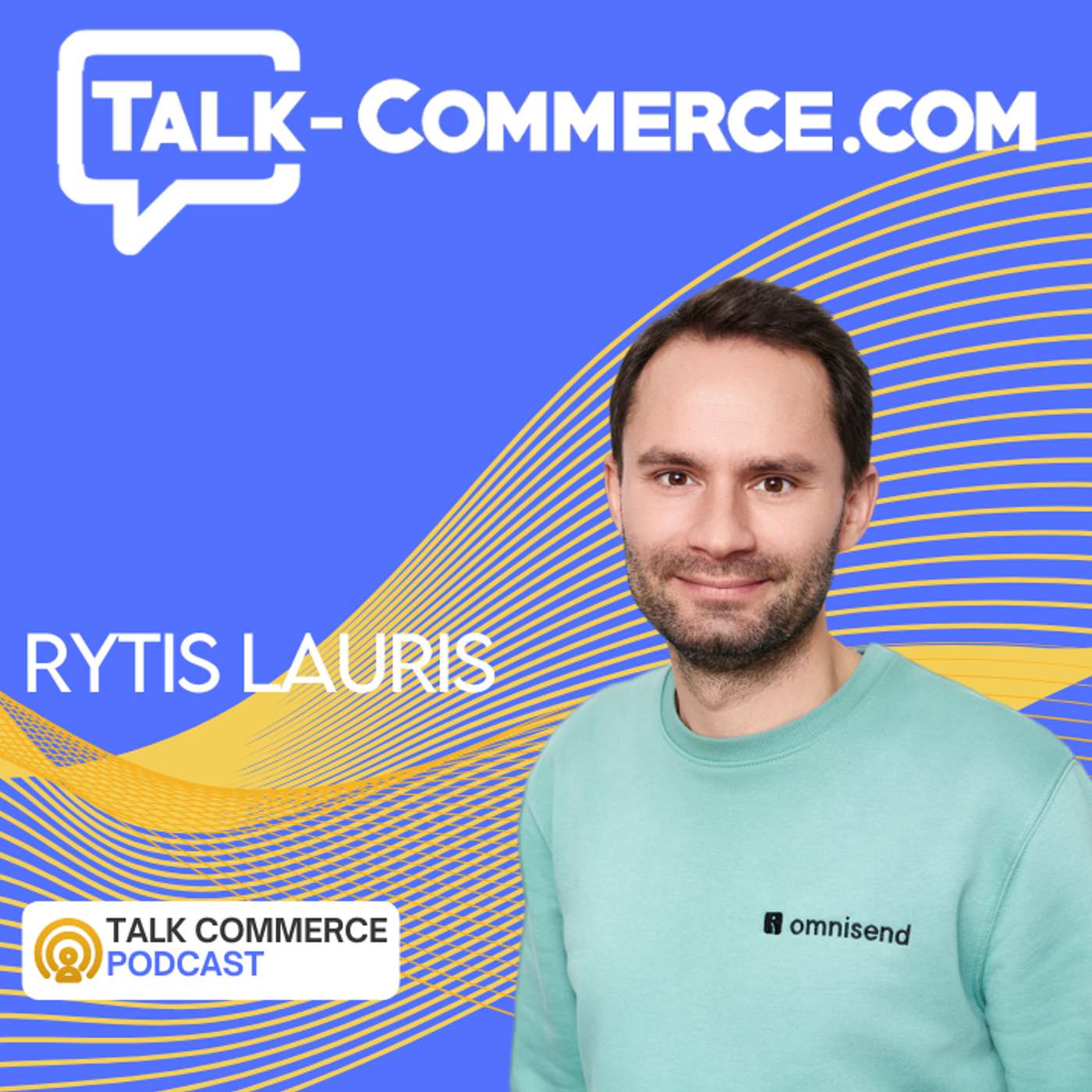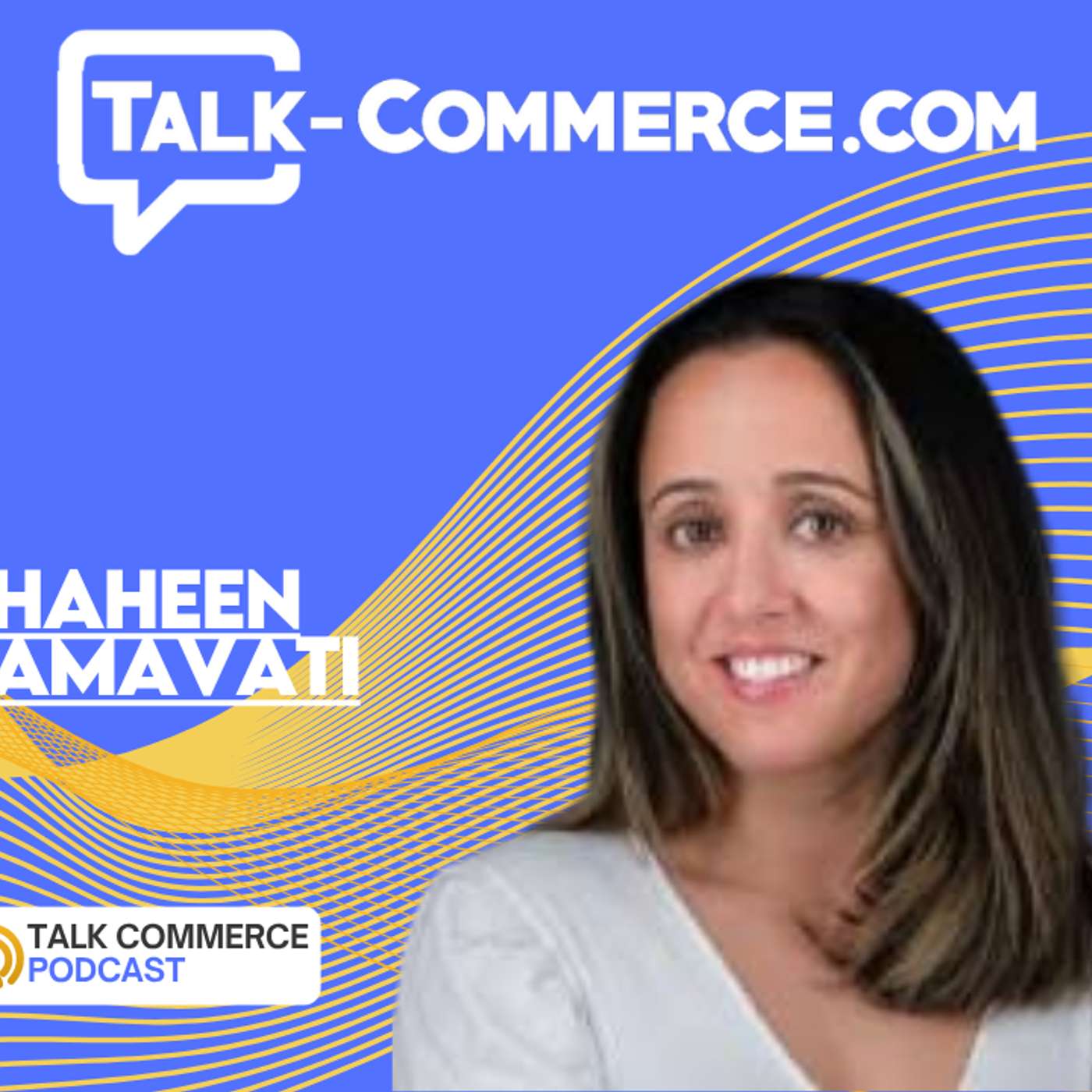Discover Talk Commerce
Talk Commerce

Talk Commerce
Author: Brent W. Peterson
Subscribed: 8Played: 126Subscribe
Share
© 2021-2024 - Talk Commerce
Description
If you are seeking new ways to increase your ROI on marketing with your commerce platform, or you may be an entrepreneur who wants to grow your team and be more efficient with your online business.
Talk Commerce with Brent W. Peterson draws stories from merchants, marketers, and entrepreneurs who share their experiences in the trenches to help you learn what works and what may not in your business.
Keep up with the current news on commerce platforms, marketing trends, and what is new in the entrepreneurial world. Episodes drop every Tuesday with the occasional bonus episodes.
You can check out our daily blog post and signup for our newsletter here https://talk-commerce.com
Talk Commerce with Brent W. Peterson draws stories from merchants, marketers, and entrepreneurs who share their experiences in the trenches to help you learn what works and what may not in your business.
Keep up with the current news on commerce platforms, marketing trends, and what is new in the entrepreneurial world. Episodes drop every Tuesday with the occasional bonus episodes.
You can check out our daily blog post and signup for our newsletter here https://talk-commerce.com
403 Episodes
Reverse
Brent Peterson interviews Vibhor Kapoor, Chief Business Officer at AdRoll. They discuss the evolution of AdRoll from a retargeting platform to a full funnel marketing solution, the importance of personalization in B2B advertising, and the future of advertising in AI platforms. Vibhor shares insights on the role of agents in e-commerce, the balance between AI-generated content and authentic storytelling, and the significance of understanding intent data for effective advertising. He also offers predictions for the upcoming quarter regarding technology and advertising innovations.TakeawaysVibhor Kapoor oversees product management, partnerships, and marketing at AdRoll.AdRoll has evolved from a retargeting platform to a full funnel marketing solution.B2B advertising requires personalization to engage multiple decision-makers.AI platforms are changing the landscape of advertising and e-commerce.Agents may play a significant role in future e-commerce transactions.Authentic content is more effective than low-quality, high-velocity content.Understanding intent data is crucial for relevant advertising.AdRoll captures intent signals to create audience predictions.The future of advertising will involve a mix of AI and human-led content.Marketers should think across channels and stages of the funnel.Chapters00:00 Introduction to Vibhor Kapoor and AdRoll02:25 Understanding AdRoll's Evolution and B2B Marketing07:32 The Future of Advertising in AI Platforms10:43 The Role of Agents in E-commerce15:49 The Balance of AI and Human Engagement in Marketing18:06 Leveraging Intent Data for Better Advertising21:38 Predictions for Q1 and Future Trends in Advertising
Brent Peterson sat down with Jorrit Steinz, founder and CEO of ChannelEngine, to discuss one of the most transformative shifts in ecommerce today: agentic commerce. The conversation covered how brands and retailers must rethink their multi-channel strategies now that AI-powered agents, from ChatGPT to Microsoft Copilot, are becoming transactional shopping platforms. With marketplaces multiplying, social commerce expanding, and LLMs entering the buying funnel, the episode delivered a forward-looking perspective on what merchants need to do right now to stay competitive.TakeawaysThe ultimate vision of agentic is consumer empowerment.Consumers will deploy agents to find products online.Agents will scrape the internet for purchasing options.In B2B, agents will facilitate shopping across platforms.Automation will enhance the shopping experience.The future of shopping involves digital agents.Agents will present curated options to consumers.B2B transactions will become more efficient with agents.The role of agents is expanding in digital commerce.Consumer agents will revolutionize how we buy. Chapters00:00 Introduction to Channel Engine and E-commerce Passion00:23 The Role of APIs and Data Feeds in E-commerce
The conversation explores the effective use of social media, particularly Meta and TikTok, for client acquisition in the legal field. It emphasizes the importance of personalization and organic strategies in building brand affinity and attracting clients.TakeawaysPersonal injury lawyers are increasingly using social media for client acquisition.Organic strategies can effectively build a following and attract clients.Humorous and relatable content, like TikTok dances, can enhance brand affinity.Personalization in marketing helps clients feel a connection with lawyers.Metta has proven successful for legal marketing, while TikTok is still emerging.Engaging content can make lawyers appear more down to earth.Social media presence is crucial for modern legal practices.Building a brand on social media requires creativity and authenticity.Law firms can benefit from showcasing their personality online.The landscape of legal marketing is evolving with social media trends.Chapters00:00 Introduction to Hona and Levi's Role00:53 Closing Thoughts and Networking Opportunities
In this episode of Talk Commerce, Brent Peterson interviews Hristo Arakliev from Hyperzon, discussing the significance of Amazon in the e-commerce landscape, the integration of AI in marketing strategies, and common pitfalls that merchants encounter when navigating multiple sales channels. Hristo emphasizes the importance of visibility and marketing over product quality alone, the need for strategic traffic management, and the necessity of optimizing for both Amazon and emerging AI-driven search engines. As the holiday season approaches, he provides insights on preparing for increased sales and advertising strategies.TakeawaysAmazon is the largest marketplace in e-commerce.Visibility is crucial for brand trust and sales.Great marketing can make mediocre products succeed.AI can streamline tasks and enhance strategy.Merchants should focus on one channel at a time.Driving traffic to D2C can benefit Amazon sales.Amazon PPC is not the only solution; organic strategies matter.Optimizing for AI search engines is becoming essential.Preparing for holiday sales requires early product shipping.Brand popularity influences advertising strategies.Chapters00:00 Introduction to Hyperzone and Extreme Sports01:37 The Importance of Amazon for DTC Brands04:15 Leveraging AI in E-commerce06:53 Common Mistakes by Merchants on Amazon08:35 Advertising Strategies for Amazon10:30 Optimizing for Search Engines and LLMs12:48 Preparing for Holiday Sales on Amazon
In this conversation, Robert Rand discusses the challenges of managing complex data systems, particularly when outsourcing solutions. He emphasizes the risks associated with relying on external services for data management and the potential issues that can arise from data discrepancies and failures.TakeawaysManaging multiple systems requires careful consideration.Outsourcing data solutions can lead to unforeseen challenges.Data discrepancies can cause significant operational issues.It's crucial to have a plan for data failures.Relying on external services may not provide long-term solutions.Understanding the quality of outsourced work is essential.Data management is a critical aspect of system integration.Adjustments to data solutions can be complicated.A lack of control over data can lead to serious problems.Proactive measures are necessary to ensure data integrity.Chapters00:00 Introduction to AI in Business00:06 Navigating AI Risks and Challenges00:27 The Importance of Human Oversight
The conversation delves into the complexities of setting up business entities in different countries, particularly focusing on the challenges faced when hiring a limited number of employees versus a larger workforce. It highlights the significant time and administrative efforts required for establishing a presence in foreign markets and the implications for cultural integration and recruitment strategies.TakeawaysSetting up an entity is complex and time-consuming.Hiring 250+ people justifies the effort of setting up an entity.For fewer hires, it may not be worth the administrative burden.Regular travel to the hiring location is often necessary.Building a strong company culture in a new location takes time.Chapters00:00 Introduction to Taylor Goucher and Passion for Fitness00:44 Benefits of Outsourcing and Cultural Considerations
In this episode of Talk Commerce, Tim Baynes, CEO and founder of Compatio, discusses the complexities of selling configurable products and the evolution of CPQ (Configure Price Quote) systems. He shares insights on how Compatio addresses the challenges of product compatibility and configuration, particularly in B2B markets. The conversation also explores the role of AI in modern configurators, the trends in digital transformation within B2B commerce, and the importance of guided selling in enhancing customer experience.Chapters00:00 Introduction to Compatio AI and Tim Baynes02:04 Tim's Journey and Background in CPQ Systems05:31 Understanding Complex Product Configuration10:28 The Evolution of CPQ Systems and Market Focus14:34 The Role of AI in Modern Configuration19:12 Guided Selling and Digital Transformation in B2B23:48 Closing Thoughts and Future of Compatio
In this episode, Erik Huberman, founder and CEO of Hawke Media, discusses his journey in building a successful marketing agency focused on challenger brands. He shares insights on the marketing landscape for small to medium-sized businesses (SMBs), the importance of choosing the right clients, and how to leverage AI in marketing strategies. Eric also provides his perspective on current market trends and the economic environment, emphasizing the need for businesses to adapt and thrive in a competitive landscape.Chapters00:00 Introduction to Erik Huberman and Hawke Media02:21 The Evolution of Hawke Media and Its Niche07:15 Choosing Clients and Building Relationships11:29 Marketing Strategies and the Role of AI22:11 Current Market Trends and Predictions for E-commerce25:25 Closing Thoughts and Shameless Plug
We've compiled our top-performing YouTube Shorts from 2025 into one power-packed rewind video! These bite-sized insights from industry leaders cover everything from Amazon advertising secrets to AI-powered retail transformation. Thanks for listening to Talk Commerce—let's dive into the highlights.1. Elizabeth Greene - Amazon Advertising MasteryCo-founder of JunglrElizabeth Greene shares game-changing Amazon advertising secrets for scaling ecommerce brands through strategic ad spending and automation tactics. Learn how to maximize your ROAS and dominate the Amazon marketplace.Listen to the full episode →2. Adam Callinan - Mathematical Precision in BusinessFounder of BottleKeeper and PentaneJoin Adam Callinan as he shares his entrepreneurial journey from creating BottleKeeper to developing Pentane. Discover how mathematical precision and lean operations drive modern business success and sustainable profitability.Listen to the full episode →3. Elijah Khasabo - The Future of UGCCo-founder of VidovoElijah Khasabo reveals insights on the evolution of user-generated content pricing, why engagement beats follower counts, and why authentic human content continues to outperform AI-generated videos in driving conversions.Listen to the full episode →4. Drew Chambers - Edge Computing RevolutionEVP at HarperDrew Chambers discusses how edge computing and AI are revolutionizing enterprise web performance. Get insights into speed optimization, personalization, and the future of ecommerce architecture.Listen to the full episode →5. Matthew Merrilees - Global Expansion StrategyCEO at Global-eMatthew Merrilees outlines actionable tactics for neutralizing tariffs, fine-tuning landed costs, and leveraging 3B2C fulfillment so brands can expand internationally without eroding profit margins.Listen to the full episode →6. Mark Elfenbein - AI Visual MerchandisingCRO of NfiniteMark Elfenbein reveals how AI and CGI technology are transforming retail visual merchandising, enabling major retailers like Amazon and Lowe's to reduce photography costs by 90% while creating immersive customer experiences at unprecedented scale.Listen to the full episode →7. Udayan Bose - Generative AI in EcommerceCEO of NetElixirUdayan Bose explores how generative AI is revolutionizing ecommerce, from boosting productivity to impacting SEO and shaping the future of Google Search. Discover key insights from this transformative conversation.Listen to the full episode →Watch the Full Rewind VideoDon't miss these concentrated insights from the brightest minds in ecommerce. Subscribe to Talk Commerce for more expert conversations that help you grow your business.What was your favorite insight? Let us know in the comments!
In this episode of Talk Commerce, Brent Peterson interviews Justin Aronstein, Chief Product Officer at Mobile1st. They discuss the importance of revenue per visitor in e-commerce, the role of friction in the shopping experience, and key metrics for success. Justin shares insights on the future of AI in e-commerce, the necessity of mobile-first design, and practical advice for preparing for the holiday sales season. The conversation emphasizes understanding customer needs and creating a seamless shopping experience.Mobile1st focuses on increasing revenue per visitor.Friction in the shopping experience can be beneficial if used correctly.Conversion rates are not the most important metric; revenue per visitor is key.Understanding customer emotions is crucial for driving sales.AI is becoming increasingly important in e-commerce, but traditional channels still matter.Designing for mobile is essential as most traffic comes from mobile devices.Product detail pages should address customer concerns and build trust.Hard abandonment campaigns can help recover lost sales.E-commerce directors face unique challenges that require tailored solutions.Having fun at work is essential for job satisfaction.Chapters00:00Introduction to Justin Aronstein02:13Mobile First: Revolutionizing E-commerce04:42Understanding User Insights and Emotional Connection10:38Key Metrics for E-commerce Success12:45The Future of AI in E-commerce16:27Designing for Mobile: The Ongoing Challenge21:43Preparing for Black Friday: Essential Tips24:34Introduction to Personal Freedom24:35The Power of Choice
In this episode of Talk Commerce, host Brent Peterson interviews Elijah Khasabo, co-founder of Vidovo, an influencer platform that connects brands with creators. Elijah shares his journey from community college to entrepreneurship, discussing the challenges and successes of building a business in the influencer marketing space. The conversation covers topics such as viral marketing strategies, the importance of engagement over follower count, the role of AI in video marketing, and tips for preparing for holiday marketing campaigns. Elijah emphasizes the significance of consistency in content creation and the value of being curious and open to learning.TakeawaysElijah Khasabo is the co-founder of Vidovo, an influencer platform.He believes in bettering oneself by helping others.The power of social media can significantly impact business success.Viral marketing can be achieved through creative content strategies.Engagement metrics are more important than follower counts.Consistency is key in content creation and audience building.AI in video marketing raises questions about authenticity.It's never too late to start creative marketing efforts.Building a community-driven platform can lead to organic growth.Learning from other founders is crucial in entrepreneurship.Chapters00:00 Introduction to Elijah Khasabo and Vidovo01:45 The Founding Story of Vidovo05:29 Viral Marketing and Content Creation09:20 Sourcing Talent and Influencer Engagement13:13 The Importance of Consistency in Content Creation16:03 AI in Video Marketing and Authenticity17:56 Preparing for Holiday Marketing Strategies
In this episode of Talk Commerce, Brent Peterson interviews Luca Borreani, co-founder of ZipChat AI. They discuss Luca's journey into the world of AI and entrepreneurship, the functionality of AI agents, and how they can enhance customer interactions and operational efficiency. The conversation also touches on the importance of leveraging AI during peak shopping seasons like Black Friday and Cyber Monday, and concludes with insights on the future of AI in business.TakeawaysLuca Borreani is the co-founder of ZipChat AI, focusing on AI solutions.He started his career in affiliate marketing and e-commerce.AI agents can automate tasks traditionally handled by humans.Promptable AI allows merchants to customize interactions.Transparency about AI usage improves customer experience.AI can proactively engage customers to enhance sales.Operational efficiency is a key benefit of AI agents.Mistakes in AI can be costly, requiring careful implementation.AI's role in e-commerce is growing, especially during peak seasons.Experimenting with AI can lead to significant business improvements.Chapters00:00 Introduction to Luca Borreani and ZipChat AI01:55 Luca's Journey into AI and Entrepreneurship03:15 Understanding AI Agents and Their Functionality06:57 Navigating Customer Interactions with AI10:50 Operational Efficiency through AI Agents13:39 Leveraging AI for Black Friday and Cyber Monday16:19 Final Thoughts on AI in Business
In this episode of Talk Commerce, Leslie Hassler, a business scaling expert, discusses her journey in founding Your Biz Rules, a fractional C-suite service aimed at helping businesses grow and scale. She emphasizes the importance of having a structured approach to business growth, the role of AI in enhancing business strategies, and the need for resilience in navigating market changes. Leslie also shares insights on maintaining individuality in business and the significance of strategic planning in uncertain times.TakeawaysLeslie Hassler is the founder of Your Biz Rules, focusing on business scaling.Your Biz Rules provides fractional C-suite services to companies.The importance of having a structured approach to business growth.AI can enhance business strategies but should not replace human expertise.Maintaining individuality is crucial for businesses to stand out.Businesses need to be resilient in the face of market changes.Strategic planning is essential for navigating uncertainties.Measuring the right metrics is key to business success.Frameworks like EOS and Scaling Up can guide business growth.Networking and community engagement are vital for business leaders.Chapters00:00 Introduction to Business Scaling02:11 The Journey of Your Biz Rules04:55 Frameworks for Business Growth09:50 The Role of AI in Business18:21 Navigating Business Trends and Predictions22:39 Shameless Plug and Closing Thoughts
In this episode of Talk Commerce, Mo ElHawary, a DTC creative strategist, shares insights into his role and the importance of understanding customer personas. He discusses the Five Whys model as a tool for uncovering deeper customer motivations and provides advice for new DTC brands on product development. As the holiday season approaches, Mo emphasizes the need for brands to focus on what is already working while also testing new concepts. He concludes with a recommendation to learn from successful brands like Huel.TakeawaysMo ElHawary has over seven years of experience as a creative strategist.Understanding customer personas is crucial for effective marketing.The Five Whys model helps uncover deeper customer motivations.Brands should focus on existing successful products during the holiday season.Testing new concepts should not consume too much time or resources.It's important for brand founders to solve problems they personally face.Successful marketing requires a deep understanding of customer needs.The holiday season is a critical time for brands to maximize sales.Early promotions can attract customers looking for deals.Learning from successful brands can provide valuable insights.Chapters00:00 Introduction to Mo ElHawary and His Role02:49 Understanding the Creative Strategy Process05:41 The 5 Whys: A Deep Dive into Customer Insights08:38 Creating Customer Personas for DTC Brands11:33 Advice for Brands During Holiday Seasons14:15 Promoting Brands and Personal Insights
In this episode of Talk Commerce, Rich Kahn, CEO and founder of Anura.io, discusses the pervasive issue of bot fraud in digital marketing. He explains how bots can significantly impact advertising budgets by generating fraudulent traffic, leading to wasted resources. Rich elaborates on the mechanics of ad fraud, the distinction between good and bad bots, and the operations of bot farms. He also shares innovative solutions to combat bot fraud, emphasizing the importance of understanding and mitigating these threats, especially as businesses prepare for high-traffic events like Black Friday.TakeawaysRich Kahn is the CEO and co-founder of Anura.io.Anura uses EOS to improve productivity and reduce meetings.Bots can steal significant amounts of advertising budgets.20-25% of traffic can be fraudulent, impacting conversions.Google Ads can inadvertently lead to fraud through partner networks.Good bots identify themselves, while bad bots mimic real users.Bot farms operate globally to execute click fraud.CAPTCHA systems are outdated and easily bypassed by bots.Anura analyzes over 800 data points to identify real users.Businesses can get a free trial to assess their fraud risk.Chapters00:00 Introduction to Rich Kahn and Anura02:25 Understanding the Bot Business and Digital Fraud05:18 The Impact of Bots on Digital Marketing08:33 Distinguishing Between Good and Bad Bots11:09 The Mechanics of Bot Farms13:19 Innovative Solutions to Combat Bot Fraud14:56 Preparing for Black Friday: Implementing Fraud Solutions15:36 Closing Thoughts and Free Trial Offer
In this conversation, James Schutrop from Scribe discusses the innovative approach of using robots to create handwritten letters, emphasizing the importance of personal touch in a world overwhelmed by digital communication. He explains how Scribe's technology integrates with CRM systems to automate the process of sending personalized thank-you letters, enhancing customer engagement. The discussion also covers the significance of authenticity in marketing, particularly through the removal of postmarks to maintain the illusion of a personal touch.TakeawaysScribe automates handwritten letters to enhance customer appreciation.People are overwhelmed by digital communication and crave personal interaction.Handwritten letters can significantly improve customer engagement.The technology uses real pens to create authentic-looking letters.Postmark removal is crucial for maintaining authenticity in marketing.Automation allows businesses to send personalized letters without manual effort.The handwritten letters are designed to look like they come from a friend or family member.Scribe's system integrates seamlessly with existing CRM platforms.The event highlights practical strategies for e-commerce businesses.Authenticity in marketing is essential to avoid customer skepticism.Chapters00:00 Introduction to Scribe and Handwritten Automation02:57 The Importance of Personal Touch in Marketing05:42 Postmark Removal and Authenticity in Handwritten Letters
In this conversation, Frank Verdeja shares his extensive experience in e-commerce and data management, discussing the importance of bridging the communication gap between technical teams and business stakeholders. He emphasizes the role of data integrity in e-commerce and the growing significance of data management systems in the age of AI. Frank expresses his enthusiasm for discovering new e-commerce companies and supporting startups in the Minneapolis area.TakeawaysFrank has 13 years of experience in e-commerce and data management.He emphasizes the importance of context in communication between technical and business teams.Data integrity is crucial for businesses of all types.Frank's company focuses on data governance and observability.He believes that understanding the value of data helps prioritize tasks.The rise of AI has made data management systems more important than ever.Customers prefer to own their data and need suitable platforms.Frank enjoys learning about new e-commerce companies in the Twin Cities.He has a passion for supporting startups and new players in the market.The conversation highlights the intersection of technology and business in e-commerce.Chapters00:00Introduction to E-commerce and Data Management02:57Bridging the Gap: Technology and Business Communication05:33Data Integrity and Its Role in E-commerce06:06The Future of E-commerce and Data Management06:06TC - Outtro All AV version 1.mp4
In this episode of Talk Commerce, Brent Peterson interviews Rytis Lauris, CEO and co-founder of Omnisend, a marketing automation platform tailored for e-commerce. They discuss the importance of retention marketing, the evolution of Omnisend, and the various touchpoints available for customer engagement. Rytis emphasizes the effectiveness of automated campaigns and the role of AI in enhancing marketing strategies. The conversation also touches on the future of e-commerce, the necessity of human involvement in automation, and the importance of standing out in a crowded market.TakeawaysRetention marketing is crucial for online sellers.Automated messages significantly increase email order rates.Combining multiple communication channels enhances customer engagement.AI tools are transforming how marketers operate.E-commerce is expected to continue growing significantly.Automated flows should be utilized for every customer journey touchpoint.Marketers need to adapt to the changing landscape of AI.Human creativity remains essential in a world of automation.Brands must maintain their unique voice to stand out.Omnisend offers presets to help businesses automate effectively.Chapters00:00 Introduction to Omnisend and Rytis Lauris02:39 The Journey of Omnisend05:16 Omnichannel Marketing Strategies08:01 The Power of Automation in Marketing10:51 AI's Role in Marketing Tools13:41 The Future of E-commerce and AI16:11 The Human Element in Marketing18:46 Closing Thoughts and Shameless Plug
Guest: Sean Callihan, Partner Manager at CommerceRecording Location: E-commerce Forum, MinneapolisEpisode Timestamps[00:00 - 01:51] Introduction and Commerce RebrandSean's background: 6 years at Commerce, 6 years in agenciesWhy BigCommerce became CommerceThree-product strategy: BigCommerce, Feedonomics, Makeswift[01:51 - 03:51] Commerce Product PortfolioFeedonomics: Platform-agnostic feed management and data optimizationMakeswift: Low-code, no-code page builder demonstrationHow products work together or independently[03:51 - 06:04] B2B Strategy and Market PositionB2B Edition as a company pillarInvestment in B2B product development and go-to-market teamsDedicated B2C and B2B teams serving different markets[06:04 - 08:10] Open SaaS Platform AdvantagesIntegration with legacy systems without rip-and-replaceImportance for B2B distributors and manufacturersExtensibility and ecosystem approach[08:10 - 12:07] AI and Agentic CommerceFeedonomics as a data platform advantagePartnerships with OpenAI and PerplexityAI data readiness for merchant discoveryProduct data enrichment from multiple sources[12:07 - 13:55] Makeswift Integration RoadmapReplacing native BigCommerce page builderBenefits for marketers and developersLow-code, no-code functionality[13:55 - 15:01] E-commerce Forum ExperienceFour years attending in person, plus virtualInclusive Midwest ecosystem approachValue of partner and merchant connectionsKey Topics: Commerce rebrand, B2B ecommerce, AI readiness, data optimization, Feedonomics, Makeswift, open SaaS, product discovery
In this episode of Talk Commerce, Shaheen Samavati, CEO of Vera Content, discusses the evolving landscape of content marketing, particularly in the context of multilingual strategies and the impact of AI. She shares insights on how businesses are adapting to new technologies while maintaining the human touch in content creation. The conversation also delves into the challenges of managing multilingual teams and the nuances of language in global marketing.takeawaysShaheen Samavati is the CEO of Vera Content, focusing on multilingual content.The demand for high-quality content remains strong despite AI advancements.Businesses are increasingly looking for efficiency in content creation.AI tools are changing the landscape of content marketing.Localization is crucial for effective global marketing strategies.Understanding language nuances is essential for successful communication.The expectation for quick content delivery is rising among clients.Human oversight is necessary to maintain content quality.Vera Content is expanding into UGC and influencer partnerships.Free resources on content marketing are available on Vera Content's website.Chapters00:00Introduction to Shaheen Samavati and Vera Content03:31The Evolution of Content Creation in a Digital Age05:13Adapting to AI in Content Creation09:39Managing Global Teams and Language Barriers11:42The Importance of Localization in Content15:11SEO and LLMs: The Future of Content Optimization17:30The Demand for Quality Content in a Saturated Market19:07The Role of Human Touch in AI-Generated Content




